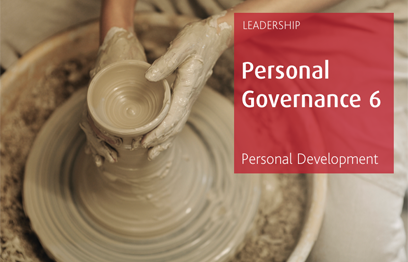Personal Governance 6 - Principle 5: Personal Development
Good Personal Governance incites lifelong personal development, or éducation permanente. This is a dynamic journey, linked to our personality development, aptitude for reflection, coping strategies, the way we communicate and interact, our ethics - and beyond. And managers must be shining examples.

Download here:
 The Art of the Real: An Interview with Tony Schwartz
The Art of the Real: An Interview with Tony Schwartz
As an executive search consultant and management coach, I see senior managers mainly emphasizing professional experience as a way to round out academic foundations, supplemented at best by a short-lived executive development program. When it comes to holistic development, this is not enough.
Knowledge is Issued in Bite Sized Chunks With Little Time to Digest Them
In-house executive development has been gathering pace over 20 years as digitization and globalization have fueled new strategies, business models, and borderless working. Yet it tends to be administered in small doses designed to minimally disrupt normal operational flow. If most companies pay lip service to executive development, little time is devoted to preparation and follow-up, trapping output and insights in a mental cage of non-reflection.
The Leaders of Tomorrow Are the Early Adopters of Today
Recent years have seen a marked progression in executive and personal development offers, led by universities of applied sciences. Young managers are increasingly motivated to follow development programs tailored to their careers, running in tandem with their professional lives and a recurrent activity offering meaningful breaks for rest and application. So the development of young managers is overtaking that of their more senior equivalents.
Executive Learning Programs Fail to Go the Distance
The higher they rise, the more senior managers seem to rely on on-the-job learning and institutional, bite-sized knowledge chunks. Time is at a premium, success is in sight, and leaders are reluctant to expose themselves to learning in groups comprising mixed functions and hierarchical levels. Executive programs offer more guarantee of peer learning and making new contacts, but even a twelve-week course is but one piece in the greater mosaic.
Mature Managers will Be In Demand, and Must Invest in Personal Development
Ageing workforce factors will increase the demand for mature managers (between 50 and 60 years old). As such, senior managers would do well to invest in their own development. The investment will bear fruit not only personally, but financially.
Management Practitioners and Recruiters Have Tunnel Vision
Hiring organizations still focus on professional experience and academic qualifications, and in turn, senior hires adopt the spirit of: “as much as necessary and as little as possible.” It’s a vicious circle. Demand from talent strategists is low, perhaps because of their own shortfalls in the domain. This is still a soft market.
Executive Coaching can Transform Professional Experience into Personal Development
Supported by Chief Knowledge Officers, today’s corporates enjoy a plethora of executive development options (global spend on employee training and education was close to $356 bn in 2015[1]). Yet senior managers are training-weary. Experience and on-the-job learning can and should be integrated into executive and personality development. We explored executive coaching as a development resource in the 4th article of our Series (Principle III, Self-reflection, Self-assessment, Self-regulation). The arena of personal development is exactly where coaching finds its home.
Lifelong Learning Will be a Fact of Long Life
Demographic realities will transform lifelong learning into a fact of long life. Many universities have installed Centers for Lifelong Learning. On-the-job, lifelong learning, (in Personal Governance, primarily off-the-job), nourishes lifelong mental vitality. Based on our curiosity to discover new things, it demands creative competence in personal renewal (and this is also a pre-condition for innovation in organizations). Seen in this light, learning should be experienced not as an obligation but as an irresistible journey of discovery, with multiple paths to multiple destinations. Neither age, time pressure, nor any other perceived constraints should be barriers. The contents must be spellbinding, and spur further discoveries still.
Ethics Can Never Be Taken For Granted
Finally, the bridge between incentives, lifelong learning, and Principle II (Ethics), deserves a mention. Demand for executive development in ethical virtues is low compared to other competencies. Ethics are simply not part of the typically sought-after leadership portfolio – they are quietly taken for granted. So demand for their development is undercooked.
6 Self-check Questions For Personal Development
- Which activities do I engage in with a view to developing my personality?
- What was my last significant development step (more than 2 weeks)?
- What effect did this have on me?
- What development step have I planned next, and how long will it last?
- What steps have I followed in ethics and ethical management?
- What do I imagine éducation permanente to be, what role does it play for me personally?
Read the full article here.
Author: Fredy Hausammann

